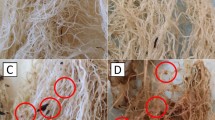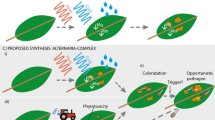Abstract
IN many seasons the kromnek disease causes heavy losses in both tobacco and tomato in the Cape Province and Transvaal. Its virus origin was first diagnosed1 in the Kat River area of the eastern Cape Province, and it has since been identified with the spotted wilt disease now well known in many parts of the world. In the Kat River area it is transmitted mainly, if not entirely, by the feeding of a thrips (Frankliniella schultzei Trybom) which has a wide host range among both wild and cultivated plants.2The virus likewise attacks a very great variety of plants3 and the control of the disease is therefore a very difficult problem which has not so far been solved for South Africa.
This is a preview of subscription content, access via your institution
Access options
Subscribe to this journal
Receive 51 print issues and online access
$199.00 per year
only $3.90 per issue
Buy this article
- Purchase on Springer Link
- Instant access to full article PDF
Prices may be subject to local taxes which are calculated during checkout
Similar content being viewed by others
References
Moore, E. S., Science Bull. 123, Dept. Agric. Union of South Africa (1933).
Moore, E. S., and Anderssen, E. E., Science Bull. 182, Dept. Agric. Union of South Africa (1939).
Hean, A. F., ‘Kromnek in South Africa”, Farming in South Africa (October 1940).
Author information
Authors and Affiliations
Rights and permissions
About this article
Cite this article
MOORE, E. Control of the Kromnek (Spotted Wilt) Disease of Tomatoes. Nature 147, 480–481 (1941). https://doi.org/10.1038/147480b0
Issue Date:
DOI: https://doi.org/10.1038/147480b0
Comments
By submitting a comment you agree to abide by our Terms and Community Guidelines. If you find something abusive or that does not comply with our terms or guidelines please flag it as inappropriate.



